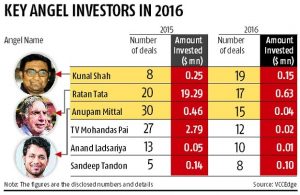Entrepreneurship prospers when aspiring entrepreneurs get capital for starting their venues. Factually, out of thousand investment-worthy start-ups three hundred are able to get the initial capital. This is the scene in India. Though, we say that the present environment is conducive for people to think of entrepreneurship as a career option because of entrepreneurship cells and incubation centres in colleges, boot-camps, hackathons, and other forums for entrepreneurship promotion. But, the fact is very few get the initial capital for their bubbling plans.
Angel investors, banks, incubators, and other financial institutions are flooded with thousands of applications, quite of few of these large numbers may not be serious contenders but they send their applications and block chances of serious as pirants. Smaller capital requirements are over looked by venture capitalists and many investors, capital requirements from 2-5 crores range are mostly entertained. There are quite a few ventures with smaller requirements of seed capital. They are not entertained because of their smaller requirements. Where do they go?
pirants. Smaller capital requirements are over looked by venture capitalists and many investors, capital requirements from 2-5 crores range are mostly entertained. There are quite a few ventures with smaller requirements of seed capital. They are not entertained because of their smaller requirements. Where do they go?
Who is an Angel Investor? An angel investor who is also known as a business angel, informal investor, angel funder, private investor, or seed investor is an affluent individual who provides capital for a business start-ups, usually in exchange for convertible debt or ownership equity. Many times Angel investors are amid known people of the entrepreneur’s family and friends. The capital angel investors provide may be a one-time investment to help the business propel or an ongoing injection of money to support and carry the company through its difficult early stages. Sometimes angel investors prefer investing through crowd-funding platform in a business.
Angel investors provide more favourable terms compared to other lenders, since they usually invest in the entrepreneur starting the business rather than the viability of the business. Angel investors are focused on helping start-ups take their first steps, rather than the possible profit they may get from the business. Essentially, angel investors are the contrary of venture capitalists. Venture capitalists look for a strong management team, a large potential market and a unique product or service with a strong competitive advantage. They also look for opportunities in industries that they are familiar with, and the chance to own a large percentage of the company so that they can influence its direction.
Origins of Angel Investors: The term “angel” came from the Broadway theatre, when wealthy individuals gave money to propel theatrical productions. The term “angel investor” was first used by the University of New Hampshire’s William Wetzel, founder of the Centre for Venture Research. Wetzel completed a study on how entrepreneurs gathered capital.
Who Can Be Angel Investors: People who meet the Securities Exchange Commission’s (SEC) standards for accredited investors can become angel investors. To become an angel investor, one must have a minimum net worth of $1 million and an annual income of $200,000.
Source of Funding: Angel investors typically use their own money, unlike venture capitalists that take care of pooled money from many other investors and place them in a strategically managed fund. Though angel investors usually represent individuals, the entity that actually provides the fund may be a limited liability company, a business, a trust or an investment fund, among many other kinds of vehicles.
Angel investors who seed start-ups that fail during their early stages lose their investments completely. This is why professional angel investors look for opportunities for a defined exit strategy, acquisitions or initial public offering (IPO).
The effective internal rate of returns for a successful portfolio for angel investors ranges from 20 to 30%. Though this may look good for investors and seem too expensive for entrepreneurs with early-stage businesses, cheaper sources of financing such as banks are not usually available for such business ventures. This makes angel investments perfect for entrepreneurs who are still financially struggling during the start-up phase of their business.
Globally some of the famous angel investors are Jeff Bezos, Paul Buchheit, Jeff Clavie, David Lee, Benjamin Ling, Dave Morin, Keith Rabois and Aydin Senkat.
Some famous Indian angel investors are:
Anupam Gopal Mittal: Founder and CEO of People Group, which owns matrimonial portal shaadi.com, realty portal makaan.com, and mobile media company Mauj Mobile, Mittal is an angel investor in over 50 startups. He was among the most active angels in India in 2015, investing in 12 start-ups. Anupam likes to back businesses that have huge market potential backed by a strong, knowledgeable core team.
Sanjay Mehta: An active member of four prolific investment groups—Indian Angel Network, Mumbai Angels, B2B 1K Ventures, and Venture Nursery—Mehta has a portfolio of over 40 startups. His investments are mostly in big data, marketing automation, and consumer services.
Zishaan Hayath: A serial entrepreneur (someone who starts and leads one business after another or, multiple businesses at the same time), Hayath began making angel investments in 2011 with Ola, Uber’s competitor in India. He now holds over 30 start-up investments and runs an angel investment group called Powai Lake Ventures.
Angel investors are in demand: We need many more angel investors. Investing in start-ups can yield good return on capital when they understand the dynamics of the asset class, yet only few individuals have become angel investors in India. Experienced entrepreneurs, successful businessmen and senior professionals have the ability to invest modest sums in start-ups. Ideally, they should co-invest small sums in start-ups.
We need to create some forums to help bring more individuals into the angel-investing arena. We need to invest time to create platforms to educate potential angel investors and guide them about angel investing. One big glaring fact is India and many developing countries need to encourage entrepreneurship, which is indeed need of the hour. We need more and more entrepreneurial ventures. We need innovations to make our life simpler, fill the gaps in development of the country in areas like infrastructure, energy, education and healthcare. And, unless we are able to provide seed-capital to deserving entrepreneurs, we will have 1000s of frustrated individuals, who could have otherwise created large businesses, millions of jobs and overall help the country to prosper.














































